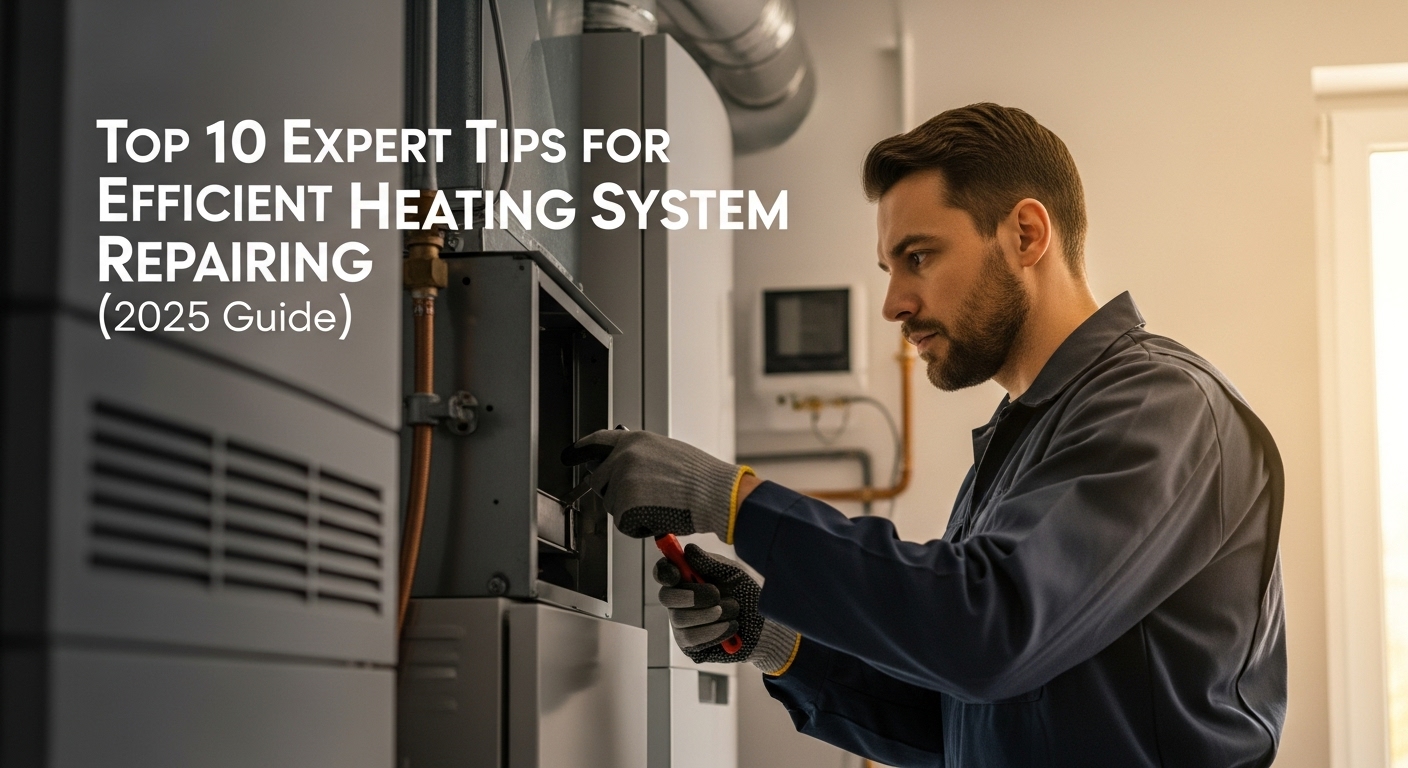Understanding the Basics of Heating System Repairing
When the cold season hits, your heating system becomes the heart of home comfort. Heating system repairing ensures that your unit operates safely, efficiently, and without unexpected breakdowns. Whether you rely on a furnace, boiler, or heat pump, understanding the fundamentals can help you recognize problems before they escalate.
Most heating systems function by generating heat through combustion or electricity and distributing it via air ducts, radiators, or floors. Over time, wear and tear, dust buildup, and component failures can reduce their performance. Timely repairs restore efficiency, prevent safety hazards, and extend the life of your system.
Different Types of Heating Systems
Before diving into repairs, it’s essential to identify your system type:
- Furnaces – Common in most households; they heat air and distribute it through ducts.
- Boilers – Use hot water or steam for heating, ideal for radiant systems.
- Heat Pumps – Provide both heating and cooling by transferring heat rather than generating it.
- Radiant Systems – Use electric coils or hot-water tubing beneath floors or walls.
Each system has unique repair requirements, and understanding these distinctions ensures accurate diagnosis.
Signs Your Heating System Needs Repairing
Recognizing early warning signs can save you from expensive repairs. Common indicators include:
- Strange Noises: Banging, clanging, or squealing often means loose or worn-out parts.
- Uneven Heating: Some rooms stay cold while others are too warm.
- Frequent Cycling: The system turns on and off too often, wasting energy.
- Higher Bills: A sudden spike in energy costs signals inefficiency.
- Unusual Odors: A burning or musty smell could point to electrical issues or mold.
If you notice any of these, schedule a professional inspection immediately.
Common Heating System Problems and Their Solutions
Thermostat Malfunctions
A malfunctioning thermostat can make your system run erratically. Check if the settings are correct, replace old batteries, and recalibrate when necessary. If problems persist, replacing the thermostat might be more cost-effective.
Airflow and Ventilation Issues
Clogged filters or blocked vents restrict airflow, causing uneven temperatures. Cleaning or replacing air filters every few months can significantly improve performance.
Pilot Light or Ignition Problems
For gas systems, a faulty pilot light or ignition sensor can prevent your furnace from starting. Always follow safety protocols — turn off the gas and contact a technician if you suspect a leak.
The Importance of Professional Heating System Repairing
While DIY repairs might seem tempting, heating systems are complex and can pose serious safety risks.
Safety Risks of Improper Repairs
Gas leaks, carbon monoxide exposure, and electrical fires are common dangers of untrained repair attempts. A certified technician ensures that repairs meet safety and efficiency standards.
Benefits of Hiring Certified HVAC Technicians
Professionals use advanced diagnostic tools, offer warranties, and provide expert guidance on maintaining your system year-round. They can also identify potential issues before they cause major damage.
Cost of Heating System Repairing in 2025
The cost of heating system repairing varies depending on the system type, age, and issue severity. On average, homeowners spend between $150–$600, but complex repairs like replacing heat exchangers can exceed $1,500.
Comparing Repair vs. Replacement Costs
If your system is over 15 years old and requires frequent repairs, replacement may be more economical. Newer systems are energy-efficient and come with better warranties, reducing long-term costs.
Preventive Maintenance for Long-Lasting Heating Systems
Preventive care is the secret to avoiding expensive breakdowns. Regular inspections, cleaning, and tune-ups can extend your system’s lifespan.
DIY Maintenance Tips for Homeowners
- Replace filters every 2–3 months.
- Keep vents clear of obstructions.
- Schedule annual professional inspections.
- Monitor your thermostat for accuracy.
Consistent maintenance can reduce repair costs by up to 40%.
Energy Efficiency and Eco-Friendly Heating Repairs
Sustainability is becoming a priority for homeowners. Eco-friendly heating system repairing focuses on minimizing energy waste and reducing emissions.
Upgrading Components for Better Efficiency
Installing smart thermostats, sealing duct leaks, and upgrading to ENERGY STAR®-rated parts can enhance efficiency by 20–30%. Many governments also offer rebates for energy-efficient upgrades.
Choosing the Right Heating Repair Service Near You
Selecting the right professional can make or break your repair experience.
Key Qualities to Look for in a Repair Company
- Proper certifications and insurance
- Transparent pricing and detailed estimates
- Positive customer reviews
- 24/7 emergency service availability
Checking reviews on trusted platforms like Angi.com can help you choose reliable professionals.
Future Trends in Heating System Repairing
The future of heating system repairing is driven by technology. IoT-enabled systems can self-diagnose problems, alert homeowners via apps, and even schedule maintenance automatically. Predictive analytics will soon allow technicians to fix issues before they occur, making heating more efficient than ever.
FAQs About Heating System Repairing
Q1. How often should I service my heating system?
At least once a year, ideally before winter begins.
Q2. What causes my heating system to blow cold air?
A faulty thermostat, dirty filters, or low refrigerant levels may be to blame.
Q3. Can I repair my heating system myself?
Minor tasks like filter changes are fine, but complex repairs should always be done by professionals.
Q4. Is it better to repair or replace an old heating system?
If it’s over 15 years old or frequently breaks down, replacement is more cost-effective.
Q5. How can I lower my heating repair costs?
Regular maintenance, using programmable thermostats, and energy-efficient upgrades help reduce costs.
Q6. What’s the average lifespan of a heating system?
Most systems last 15–20 years with proper care and maintenance.
Conclusion: Keeping Your Heating System Reliable and Efficient
Timely heating system repairing not only keeps your home warm but also ensures safety and energy efficiency. By identifying problems early, hiring certified professionals, and following preventive maintenance, you can enjoy comfort and savings for years to come. A well-maintained heating system is an investment in both peace of mind and long-term performance.

